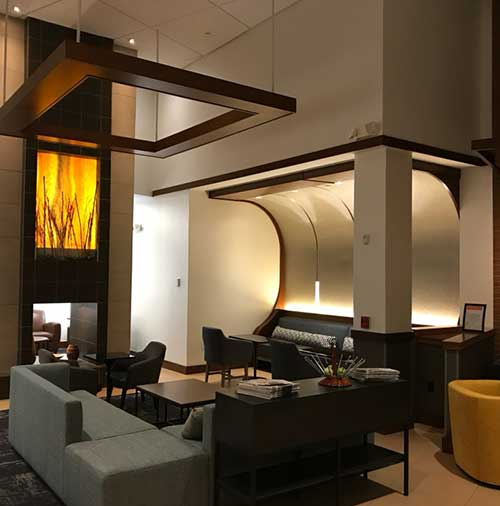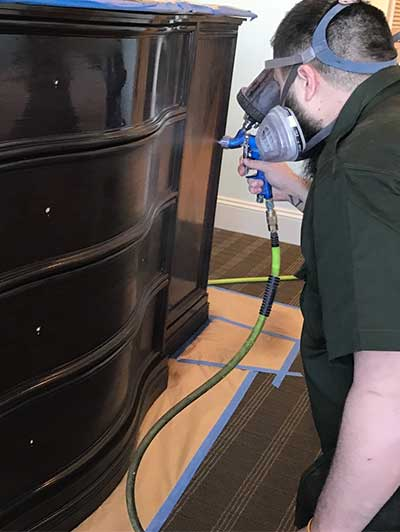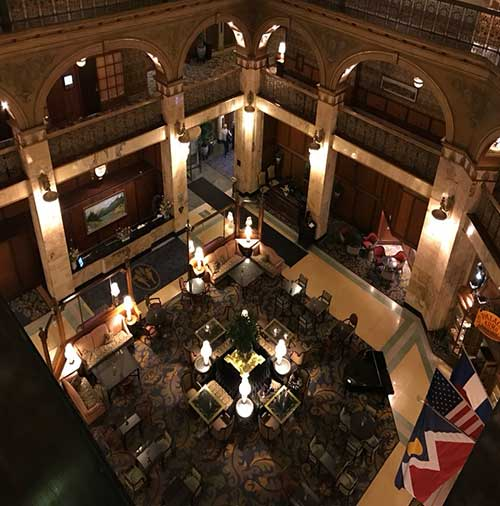
Hotel furniture restoration is an essential part of maintaining the appeal and functionality of a hotel, but it can also present challenges, particularly when it comes to minimizing disruption for guests.
In the competitive hospitality industry, guest experience is paramount, and no one wants their stay disturbed by loud noises, dust, or restricted access to facilities. So how can hotels manage hotel furniture restoration projects while ensuring day-to-day operations continue smoothly?
This blog explores how restoration can be approached in a way that minimizes inconvenience to guests, enhances the longevity of hotel furniture, and ensures a hotel’s reputation for comfort and style remains intact.
1. Strategic Planning and Communication
The key to minimizing guest disruption during hotel furniture restoration is planning. Restoration projects need to be thoroughly organized and communicated to avoid unexpected inconveniences for guests.
Scheduling work during low-occupancy periods or seasons can significantly reduce the number of guests affected. Many hotels also stagger their restoration schedules, focusing on specific areas of the hotel while leaving others fully operational.
Clear communication is vital as well. Inform guests ahead of time about any upcoming furniture work that might affect their stay, such as in their rooms, the lobby, or restaurants. Offering complimentary services like free meals or upgrades during the restoration period can help mitigate potential dissatisfaction.
Furthermore, the expertise of hotel furniture refurbishment specialists ensures the restoration process is as efficient and non-intrusive as possible, keeping disruptions to a minimum.
2. Prioritizing Quiet Restoration Methods
Not all hotel furniture restoration methods are loud or disruptive. Selecting quieter processes such as hand-refinishing or hotel furniture touch-up services can ensure minimal noise during repairs. For instance, hotel wooden furniture touch-ups might only require a small team of professionals with hand tools, allowing the project to proceed smoothly without causing excessive noise or disruption. These methods can be performed in short, focused sessions during off-peak hours, ensuring guests are unaffected.
Choosing professional hotel furniture refinishing services that specialize in working within the hospitality environment can be incredibly beneficial. These experts understand the importance of maintaining a peaceful atmosphere and use techniques that align with a hotel’s operations.

3. Phased Restoration Approach
One of the most effective strategies to limit guest disruption is using a phased approach for hotel furniture maintenance and restoration. Rather than closing off large sections of the hotel, restoration can be broken down into smaller, manageable phases, focusing on one area at a time.
This allows hotel operations to continue as usual in other areas, ensuring guests can still enjoy a comfortable and functional environment during their stay.
For instance, hotels can prioritize high-traffic areas such as the lobby or restaurant during hours of low guest usage, while quieter times can be used for more delicate areas like rooms or conference facilities.
This phased approach ensures that hotel furniture repair services are conducted efficiently, without affecting the guest experience. Engaging with hotel furniture repair experts ensures that projects are completed with both speed and precision, maintaining the integrity and appearance of the furniture while reducing disruption.
4. Quick Turnaround from Professionals
Choosing the right team for furniture repair for hotels plays a critical role in minimizing downtime. Experienced hotel furniture repair experts can ensure a quick turnaround on restoration tasks, using techniques and products that facilitate fast drying and curing times.
For instance, hotel bathroom vanity refinishing can be completed using materials that set quickly, allowing guests to regain access to their rooms faster. This not only improves the guest experience but also reduces the impact on the hotel’s revenue by keeping rooms available for bookings.
Professional restoration teams also understand the complexities of working in a hotel environment, where guest satisfaction is paramount. By partnering with hotel furniture refurbishment specialists, hotels can ensure that every aspect of the restoration, from hotel casegood repair to luxury hotel furniture touch-ups, is carried out swiftly and efficiently.
Prioritizing Non-Peak Times for Furniture Restoration
One of the most effective ways to minimize guest disruption is by scheduling hotel furniture restoration during non-peak times. Hotels tend to have off-seasons or times when occupancy rates are lower.
By planning major restoration projects during these periods, you reduce the likelihood of guests encountering the disruption. Additionally, working during less busy hours, such as late nights or early mornings, can keep guest interaction with maintenance crews to a minimum.
Another benefit of scheduling hotel casegood refinishing during non-peak times is that it allows the hotel to operate normally without turning away guests or blocking off large areas. A careful, phased approach to furniture repair for hotels ensures that the property continues to function smoothly, without hindering daily hotel operations or affecting the guest experience.
Maintaining Aesthetic Appeal During Restoration
Even though hotel furniture repair services may be underway, it’s essential to maintain the hotel’s aesthetic appeal throughout the process. Hotel owners and general managers can ensure that the environment remains visually pleasing by focusing on the areas that guests see first, such as lobbies, restaurants, and common spaces. This prioritization can also extend to public furniture, such as seating in waiting areas or hotel bars, allowing the hotel to retain its luxury appeal.
In the case of larger, more complex projects like hotel restaurant furniture restoration or hotel bathroom vanity refinishing, hotels can opt for subtle, behind-the-scenes repair processes. By covering work areas, using visually appealing barriers, or even dividing restoration into smaller, contained phases, the hotel can ensure that guests are largely unaware of the ongoing work.
Additionally, working with hotel furniture refurbishment specialists ensures that restoration processes are handled efficiently and aesthetically. These professionals understand the importance of keeping the hotel’s brand image intact while conducting repairs, offering high-quality results with minimal visible disruption.

Communication is Key: Keeping Guests Informed
One of the most critical strategies for minimizing guest disruption is effective communication.
When guests are kept in the loop about hotel furniture maintenance plans, they are less likely to be caught off guard or feel inconvenienced. Hotels should inform guests ahead of time if certain amenities or areas will be unavailable due to hotel furniture restoration.
This can be done through email notifications, signage in the lobby, or friendly reminders from front-desk staff at check-in.
Transparency regarding the restoration process shows guests that the hotel is actively working to maintain its quality and that their comfort remains a top priority. When professional hotel furniture refinishing is necessary, communicating the timeframe and benefits of the work can transform a potential inconvenience into a positive experience, showing that the hotel is dedicated to maintaining its high standards.
Partnering with the Right Restoration Experts
Choosing the right hotel furniture repair expert is essential to ensure a smooth and efficient process with minimal disruption. Experienced professionals know how to conduct work with precision, speed, and respect for the hotel’s environment. Professional hotel furniture refinishing experts can also recommend materials and finishes that reduce the need for future disruptions by providing longer-lasting results.
Working with hotel furniture restoration experts who have experience in the hospitality industry ensures that the unique needs of a hotel are taken into account, from guest comfort to operational efficiency. Hotel furniture refinishing experts can customize their approach based on the hotel’s style, ensuring that the final product aligns with the hotel’s aesthetic vision.
When choosing a restoration partner, look for companies that offer comprehensive services, from hotel wooden furniture touch up to complete refinishing, as this helps to keep all furniture repairs streamlined under one service provider.
The Bottom Line
Restoring hotel furniture is an inevitable part of maintaining a high standard of guest service and experience. By focusing on discreet, phased processes, planning around non-peak hours, and communicating clearly with guests, hotels can conduct hotel furniture repair services with minimal disruption.
With the help of skilled hotel furniture refurbishment specialists, restoration becomes an opportunity to enhance both aesthetics and functionality, ensuring that guests enjoy a seamless, comfortable stay.
For seamless hotel furniture restoration that prioritizes guest comfort, consider partnering with the experts at PIP Pros.
Our professional hotel furniture repair services are tailored to meet the unique needs of the hospitality industry, offering everything from hotel furniture refinishing to specialized hotel restaurant furniture restoration.
Learn more about us by contacting us today.



